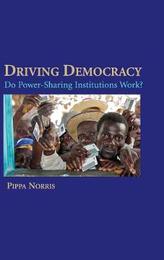
|
Driving Democracy: Do Power-Sharing Institutions Work?
Hardback
Main Details
| Title |
Driving Democracy: Do Power-Sharing Institutions Work?
|
| Authors and Contributors |
By (author) Pippa Norris
|
| Physical Properties |
| Format:Hardback | | Pages:320 | | Dimensions(mm): Height 240,Width 160 |
|
| ISBN/Barcode |
9780521873192
|
| Classifications | Dewey:321.8 |
|---|
| Audience | | Professional & Vocational | |
|---|
| Illustrations |
20 Tables, unspecified; 33 Line drawings, unspecified
|
|
Publishing Details |
| Publisher |
Cambridge University Press
|
| Imprint |
Cambridge University Press
|
| Publication Date |
1 August 2008 |
| Publication Country |
United Kingdom
|
Description
Proposals for power-sharing constitutions remain controversial, as highlighted by current debates in Iraq, Afghanistan, Nepal, and Sudan. This book updates and refines the theory of consociationalism, taking account of the flood of contemporary innovations in power-sharing institutions that have occurred worldwide. The book classifies and compares four types of political institutions: the electoral system, parliamentary or presidential executives, unitary or federal states, and the structure and independence of the mass media. The study tests the potential advantages and disadvantages of each of these institutions for democratic governance. Cross-national time-series data concerning trends in democracy are analyzed for all countries worldwide since the early 1970s. Chapters are enriched by comparing detailed case studies. The mixed-method research design illuminates the underlying causal mechanisms by examining historical developments and processes of institutional change within particular nations and regions.
Author Biography
Pippa Norris is the McGuire Lecturer in Comparative Politics at the John F. Kennedy School of Government, Harvard University and Director, Democratic Governance, United Nations Development Program. Her work compares elections and public opinion, gender politics, and political communications. Companion volumes by this author, also published by Cambridge University Press, include A Virtuous Circle (2000), Digital Divide (2001), Democratic Phoenix (2002), Rising Tide (2003), Electoral Engineering (2004), Sacred and Secular (2004), and Radical Right (2005).
Reviews"Across the past decade, Pippa Norris's work on democracy has asked how democracy develops, what democracy provides, and how democracy fares in its relationship to, e.g., the media, electoral rules, gender, and religion. In Driving Democracy, she asks how democratic political systems might be consolidated and sustained across time, and investigates types of political structures that might serve to increase democrac's chances of taking hold and succeeding. Grounded in a multiple-methods comparative approach, Driving Democracy summarizes and critiques a wide range of democratic literatures; develops comprehensive tests of democratic development; and concludes that, with qualifications, power-sharing arrangements offer democracy its best chances for success. As a result, Driving Democracy is a major contribution to scholarship on democracy. It will be required reading in courses on political development, comparative democracies, democratic transitions, and electoral studies, and will serve as a touchstone volume for scholars of democratic politics." -Karen Beckwith, Case Western Reserve University "In this meticulously researched and clearly written book, Pippa Norris makes a compelling case for the value of power-sharing institutions. She shows that such institutions increase the likelihood of successful democratic governance and do so independently of other factors, including economic development, colonial history or regional neighborhood. The book is methodologically rigorous, combining the strengths of qualitative case-study and quantitative (large-N) approaches. Norris is ultra-careful throughout, avoiding unsubstantiated claims, and consistently confronting alternative explanations to her own. Her book will impact not just on the academy but, more importantly, on the policy world where getting it right on these matters saves lives." -John McGarry, Canada Research Chair in Nationalism and Democracy, Queen's University, Canada and Senior Expert in Power-Sharing at the UN (Dept. of Political Affairs) "In Driving Democracy Pippa Norris has conducted the most systematic investigation of the effect of power sharing institutions since Lijphart's groundbreaking work of the 1970s. The fact that she finds significant evidence to support the thesis that power sharing is better for new democracies offers some hope to the most fragile divided societies in the world today." -Andrew Reynolds, University of North Carolina at Chapel Hill
|